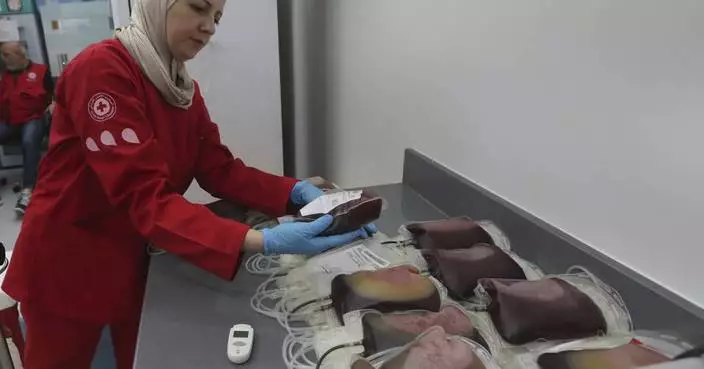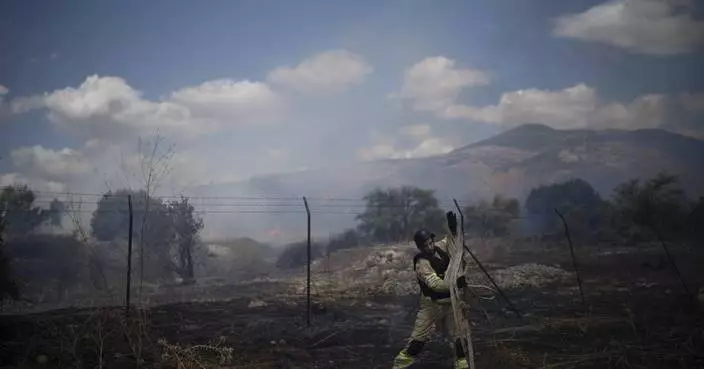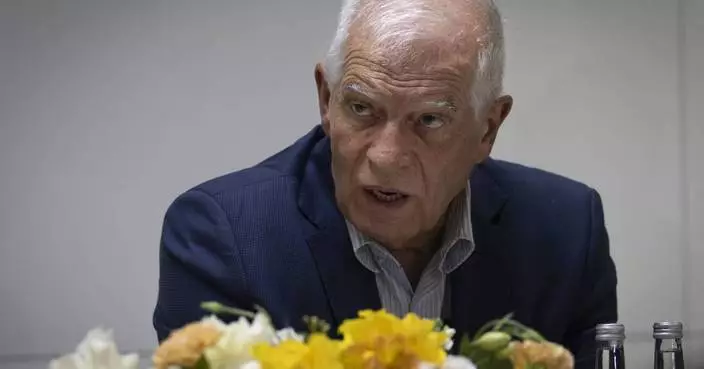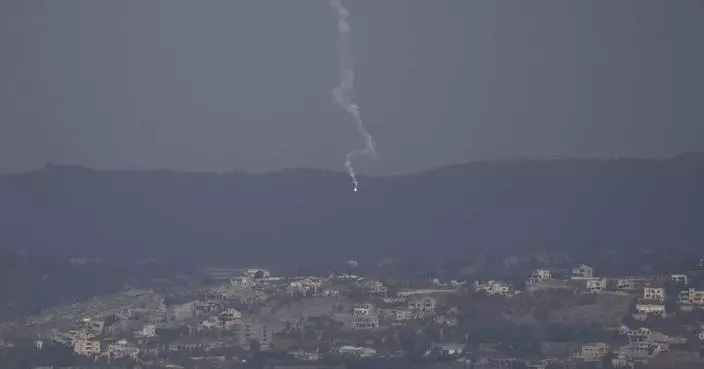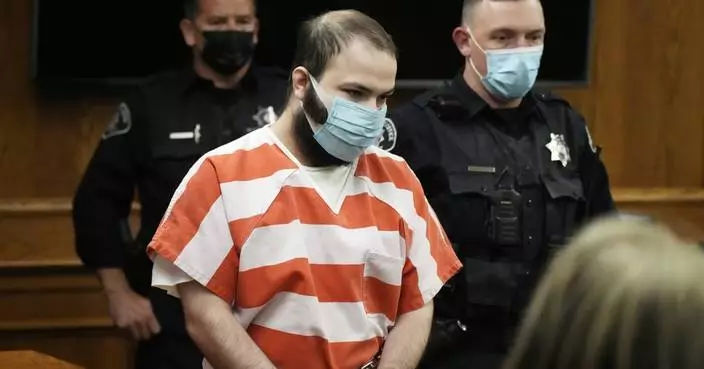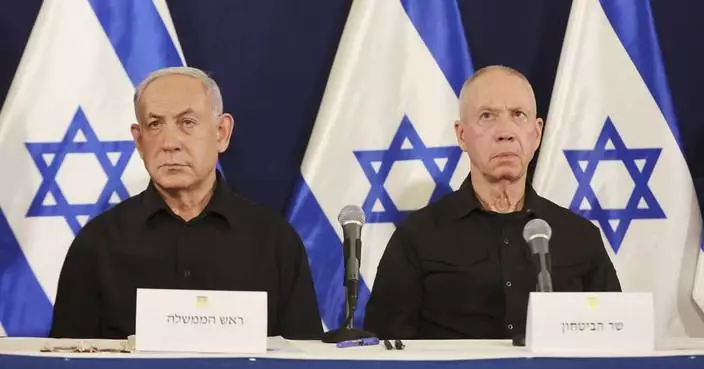Most of the protesters killed this week by Israeli fire along the border with the Gaza Strip were members of Hamas, the militant group said Wednesday, an assertion that deepens the starkly different narratives on both sides over the deaths.
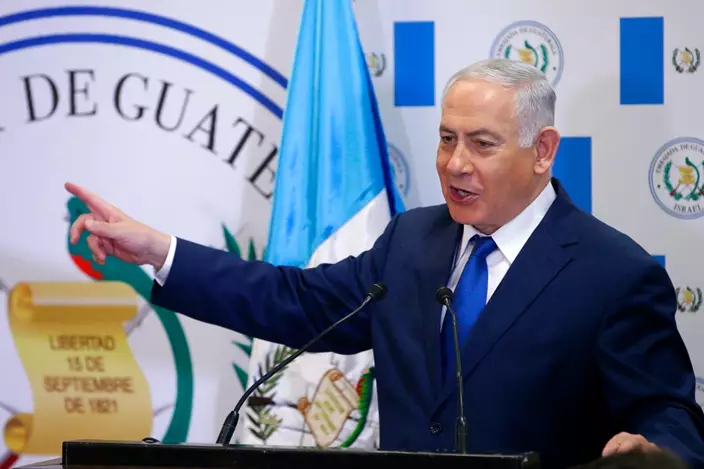
Israel Prime Minister Benjamin Netanyahu gestures as he speaks during the dedication ceremony of the Guatemala Embassy in Jerusalem, Israel, Wednesday May 16, 2018. (Ronen Zvulun/Pool via AP)
Israel, which has faced blistering international criticism over its response, is likely to latch on to the remarks to bolster its claims that Hamas has used the weekly border protests as cover to stage attacks.
But human rights groups say the identity of slain protesters, including a possible affiliation to a militant group, is irrelevant if they were unarmed and did not pose an immediate threat to the lives of soldiers when they were shot.
In an interview with Baladna TV, a private Palestinian news outlet that broadcasts via Facebook, senior Hamas official Salah Bardawil said 50 out of the nearly 60 protesters killed Monday were Hamas members, with the others being "from the people."
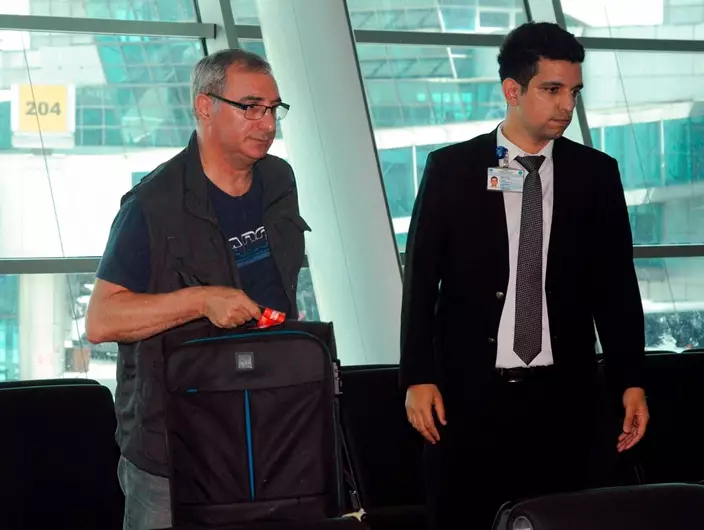
Israeli ambassador to Turkey Eitan Na'eh, left, waits at Ataturk International Airport before his flight to Israel, in Istanbul, Wednesday, May 16, 2018. Turkey on Tuesday temporarily expelled Israel's ambassador in Ankara after he was called into the ministry, where Turkey relayed its condemnation of Israel's use of deadly force on Gaza protesters. (DHA-Depo Photos via AP)
Bardawil did not elaborate on the nature of their membership in the group and his claim could not be independently verified. It was unclear if the protesters he was referring to were militants or civilian supporters of the Islamic group, which rules Gaza and opposes Israel's existence.
The affiliation may matter little to those who have deemed Israel's response to the protests to be heavy-handed.
For Israel, it was enough to cement its narrative.
"It was clear to Israel and now it is clear to the whole world that there was no popular protest. This was an organized mob of terrorists organized by Hamas," said Israeli Foreign Ministry spokesman Emmanuel Nahshon.
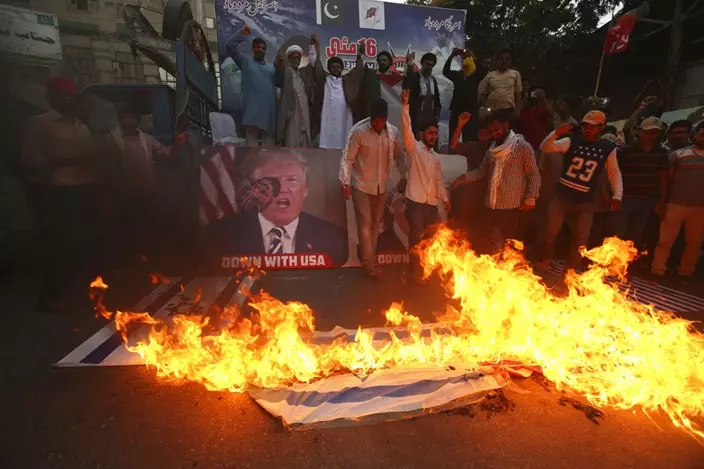
Pakistani Shiite Muslims burn representations of Israeli flags during a rally to protest the move of the U.S. embassy from Tel Aviv to Jerusalem, in Karachi, Pakistan, Wednesday, May 16, 2018. (AP Photo/Fareed Khan)
Prime Minister Benjamin Netanyahu said Israel had tallied similar numbers to Hamas and "won't let those who call for our destruction to breach our borders and to threaten our communities."
In response to the uproar over his remarks, Bardawil later said in a statement that Israel was "legitimizing the killing of Palestinians just because they are Palestinians or just because they are Hamas, even if they were unarmed and defending their dignity and rights."
Organizers say the wave of border protests is meant in large part to break a decade-old blockade imposed by Israel and Egypt and pressure Israel to ease its restrictions. Since the Hamas-led protests began March 30, more than 110 Palestinians have been killed and more than 2,500 wounded by live fire, according to the Palestinian Health Ministry. Palestinian officials say the vast majority of the casualties have been unarmed protesters. One Israeli soldier has been wounded.
The weekly protests peaked on Monday when about 40,000 Gaza residents descended on the border area. As in previous demonstrations, smaller groups of protesters broke away and moved closer to the border fence, burning tires, throwing stones or hurling firebombs. Some tried to attack the border fence.
Israeli snipers, perched behind sand berms, opened fire from the other side of the fence, killing 59 Palestinians and wounding hundreds.
Images of the protesters being whisked away in stretchers amid the tear gas contrasted sharply Monday with jubilant scenes of the opening of the U.S. Embassy in Jerusalem by a high-powered American delegation and Israeli leaders. Hardly a mention was made of the border violence, only about an hour's drive away.
The Israeli army has defended its actions. It points to the violent history of Hamas, says there have been shootings and bombing attacks against its forces, and fears a mass border breach.
On Tuesday, the army released a video that appeared to show protesters detonating several explosions near the border. It also said its forces had killed a squad of Hamas gunmen who opened fire at troops.
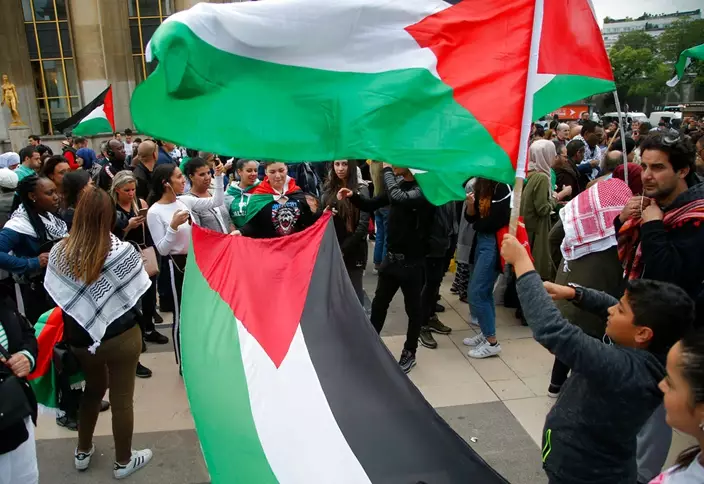
Demonstrators wave Palestinian flags as they stage a protest to condemn the Israeli fire along the Gaza Strip at Trocadero plaza in Paris, France, Wednesday, May 16, 2018. Hamas says that most protesters killed by Israeli fire were its members. (AP Photo/Michel Euler)
Lt. Col. Jonathan Conricus, a military spokesman, said 14 of those killed Monday were actively involved in carrying out attacks.
Omar Shakir, the local director for Human Rights Watch, said that under international law, Israel cannot use lethal force against unarmed protesters, regardless of their identity or possible affiliation with a militant group.
"These individuals that were killed, regardless of their affiliation or membership, were engaged in a demonstration in which they did not pose an immediate threat to life and were gunned down, and that's what's relevant," Shakir said.
Israel says it uses live fire only as a last resort. Snipers are supposed to aim at protesters' legs and can shoot only with approval from a commander.
However, some protesters were shot while standing dozens of meters (yards) from the border fence or, in one case, while running way, according to video and witness accounts. At least nine of those killed were minors, including a 14-year-old boy who was taking cover from tear gas when he was shot last month.
Hamas' statement comes at a moment when Israel finds itself largely isolated over its response to the protests.
Countries have summoned and recalled ambassadors, the U.N. has issued condemnations and some have called for an investigation of Israel's actions. The Palestinians held a one-day general strike and called for three days of mourning for the victims.
The U.S. was among the few countries that came to Israel's defense, backing its right to protect its border on the same day that it countered international disapproval of moving its embassy from Tel Aviv to Jerusalem. The Palestinians, who seek east Jerusalem as capital of their hoped-for state and vehemently oppose the U.S. move, recalled their ambassadors to four European countries that had supported it.
On Wednesday, Guatemala followed the U.S. lead, festively opening its new Jerusalem mission with Guatemalan President Jimmy Morales saying his country was bringing a message of "love, peace and fraternity" to Israel. Paraguay said it also will move its embassy to Jerusalem. Romania, the Czech Republic and Honduras have said they are considering doing the same.
JERUSALEM (AP) — With Israel's defense minister announcing a “new phase” of the war and an apparent Israeli attack setting off explosions in electronic devices in Lebanon, the specter of all-out combat between Israel and Hezbollah seems closer than ever before.
Hopes for a diplomatic solution to the conflict appear to be fading quickly as Israel signals a desire to change the status quo in the country's north, where it has exchanged cross-border fire with Hezbollah since the Lebanese militant group began attacking on Oct. 8, a day after the war's opening salvo by Hamas.
In recent days, Israel has moved a powerful fighting force up to the northern border, officials have escalated their rhetoric, and the country’s security Cabinet has designated the return of tens of thousands of displaced residents to their homes in northern Israel an official war goal.
Here's a look at how Israel is preparing for a war with Lebanon:
While the daily fighting between Israel and Hezbollah has escalated on several occasions, the bitter enemies have been careful to avoid an all-out war.
That appears to be changing — especially after pagers, walkie-talkies, solar equipment and other devices exploded in Lebanon on Tuesday and Wednesday, killing at least 20 and wounding thousands in a sophisticated attack Hezbollah blamed on Israel.
“You don’t do something like that, hit thousands of people, and think war is not coming,” said retired Israeli Brig. Gen. Amir Avivi, who leads Israel Defense and Security Forum, a group of hawkish former military commanders. “Why didn't we do it for 11 months? Because we were not willing to go to war yet. What’s happening now? Israel is ready for war."
As fighting in Gaza has slowed, Israel has fortified forces along the border with Lebanon, including the arrival this week of a powerful army division that took part in some of the heaviest fighting in Gaza.
The 98th Division is believed to include thousands of troops, including paratrooper infantry units and artillery and elite commando forces specially trained for operations behind enemy lines. Their deployment was confirmed by an official with knowledge of the matter who spoke on the condition of anonymity to discuss troop movements.
The division played a key role in Gaza, spearheading the army's operations in the southern city of Khan Younis, a Hamas stronghold. The offensive inflicted heavy losses on Hamas fighters and tunnels, but also wreaked massive damage, sent thousands of Palestinians fleeing and resulted in scores of civilian deaths. Israel says Hamas endangers civilians by hiding in residential areas.
The military also said it staged a series of drills this week along the border.
"The mission is clear," said Maj. Gen. Ori Gordin, who heads Israel's Northern Command. “We are determined to change the security reality as soon as possible.”
The military movements have been accompanied by heightened rhetoric from Israel's leaders, who say their patience is running thin.
Defense Minister Yoav Gallant on Wednesday night declared the start of a “ new phase” of the war as Israel turns its focus toward Hezbollah. "The center of gravity is shifting to the north by diverting resources and forces,” he said.
He spoke a day after Israel's Cabinet made the return of displaced residents to their homes in northern Israel a formal goal of the war. The move was largely symbolic — Israeli leaders have long pledged to bring those residents home. But elevating the significance of the aim signaled a tougher stance.
After meeting Wednesday with top security officials, Prime Minister Benjamin Netanyahu declared: “We will return the residents of the north securely to their homes.”
Netanyahu delivered a similarly tough message with a top U.S. envoy sent to the region this week to soothe tensions.
An official with knowledge of the encounter told The Associated Press that the envoy, Amos Hochstein, told Netanyahu that intensifying the conflict with Hezbollah would not help return evacuated Israelis back home.
Netanyahu, according to a statement from his office, told Hochstein that residents cannot return without “a fundamental change in the security situation in the north." The statement said that while Netanyahu “appreciates and respects” U.S. support, Israel will “do what is necessary to safeguard its security.”
Israeli media reported Wednesday that the government has not yet decided whether to launch a major offensive in Lebanon.
Much, it seems, will depend on Hezbollah's response. The group's leader, Hassan Nasrallah, is expected to deliver a major speech on Thursday.
But public sentiment in Israel seems to be supportive of tougher action against Hezbollah.
A poll in late August by the Israeli Democracy Institute, a Jerusalem think tank, found that 67% of Jewish respondents thought Israel should intensify its response to Hezbollah. That includes 46% of Jewish respondents who believed Israel should launch a deep offensive striking Lebanese infrastructure, and 21% who seek an intensified response that avoids striking Hezbollah infrastructure.
“There’s a lot of pressure from the society to go to war and win,” said Avivi, the retired general. “Unless Hezbollah tomorrow morning says, ’OK, we got the message. We’re pulling out of south Lebanon,' war is imminent.”
Such a war would almost certainly prove devastating to both sides.
Already, more than 500 people have been killed in Lebanon by Israeli strikes since Oct. 8, most of them fighters with Hezbollah and other armed groups but also more than 100 civilians. In northern Israel, at least 23 soldiers and 26 civilians have been killed by strikes from Lebanon.
Israel inflicted heavy damage on Lebanon during a monthlong war against Hezbollah in 2006 that ended in a stalemate. Israeli leaders have threatened even tougher action this time around, vowing to repeat the scenes of destruction from Gaza in Lebanon.
But Hezbollah also has built up its capabilities since 2006. Hezbollah has an estimated 150,000 rockets and missiles, some believed to have guidance systems that could threaten sensitive targets in Israel. It has also developed an increasingly sophisticated fleet of drones.
Capable of striking all parts of Israel, Hezbollah could bring life in Israel to a standstill and send hundreds of thousands of Israelis fleeing.
Associated Press Writer Natalie Melzer in Jerusalem contributed to this report.
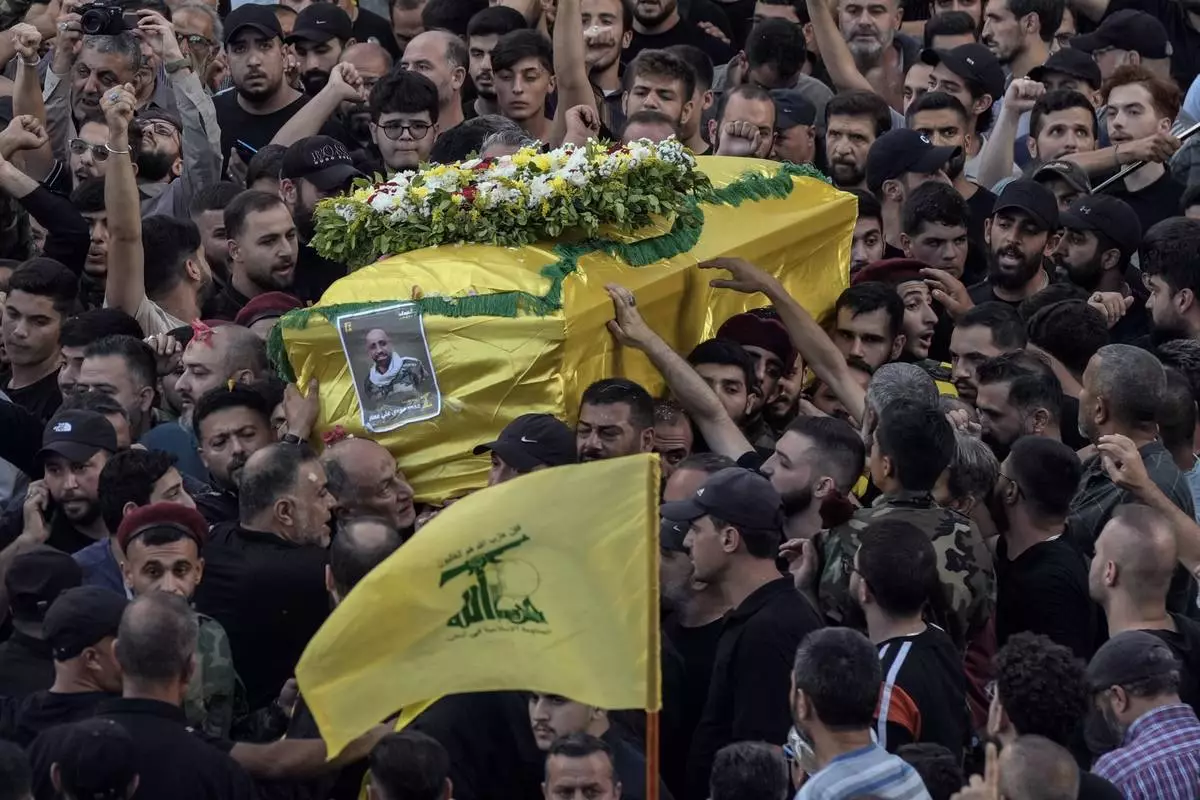
Mourners carry the coffin of Mohammed Mahdi, son of Hezbollah legislator Ali Ammar, who was killed Tuesday after his handheld pager exploded, in the southern suburb of Beirut, Lebanon, Wednesday, Sept. 18, 2024. (AP Photo/Bilal Hussein)
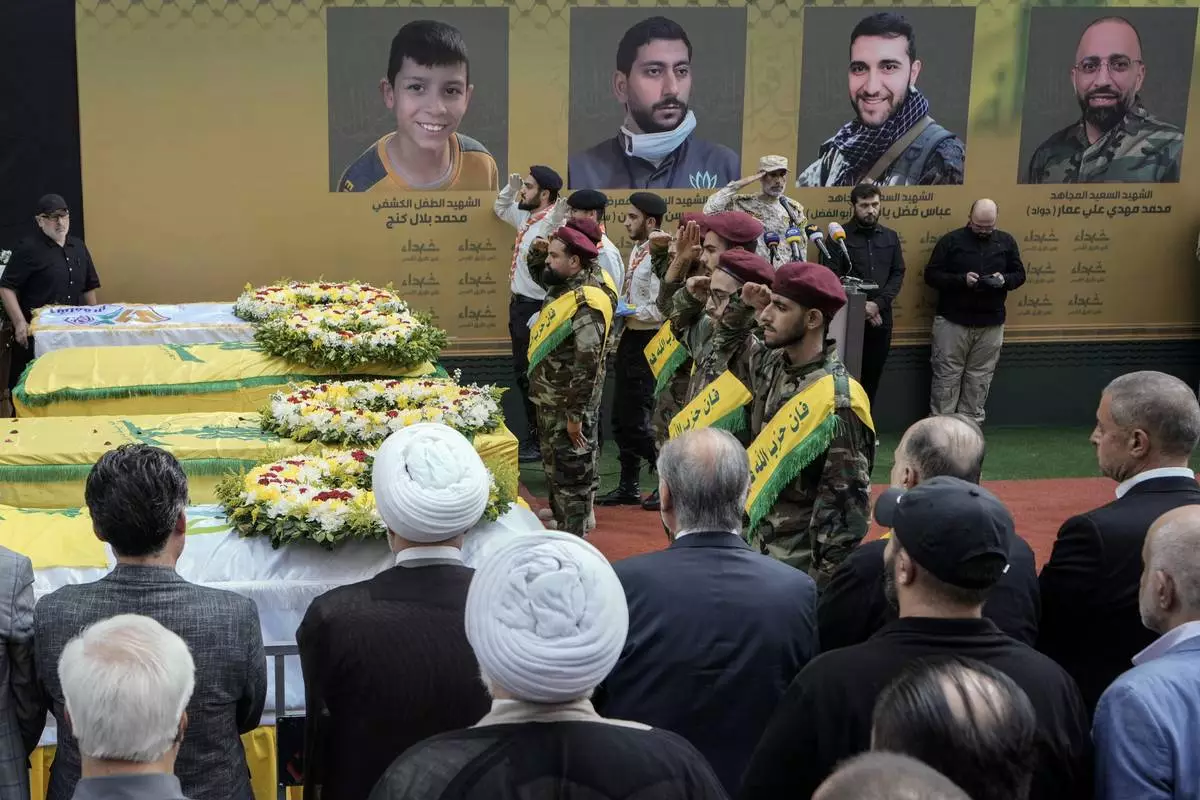
Hezbollah fighters salute as they stand next to the coffins of four victims who were killed Tuesday after their handheld pagers exploded, during their funeral procession in the southern suburb of Beirut, Lebanon, Wednesday, Sept. 18, 2024. (AP Photo/Bilal Hussein)
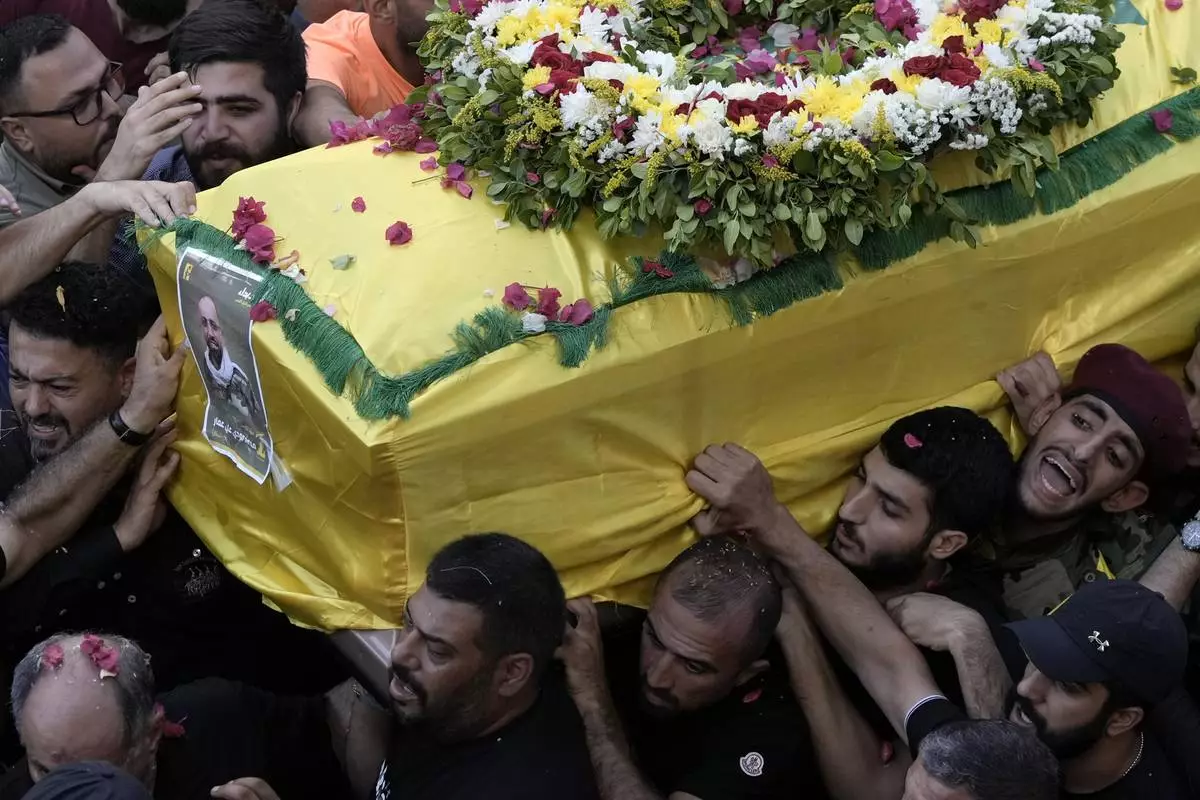
Hezbollah fighters carry one of the coffins of four fallen comrades who were killed Tuesday after their handheld pagers exploded, in the southern suburb of Beirut, Lebanon, Wednesday, Sept. 18, 2024. (AP Photo/Bilal Hussein)
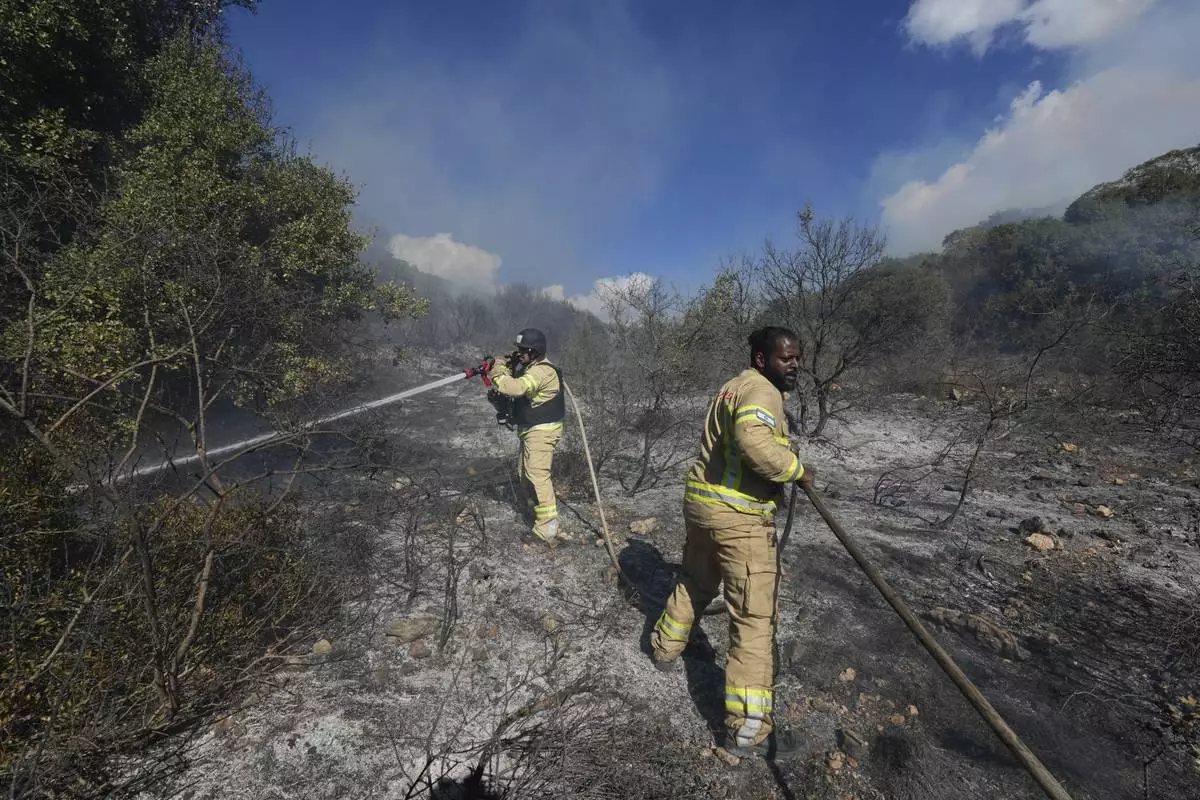
Israeli firefighters work to extinguish a fire after a rocket fired from Lebanon hit an open field in northern Israel, Wednesday, Sept. 18, 2024. (AP Photo/Baz Ratner)
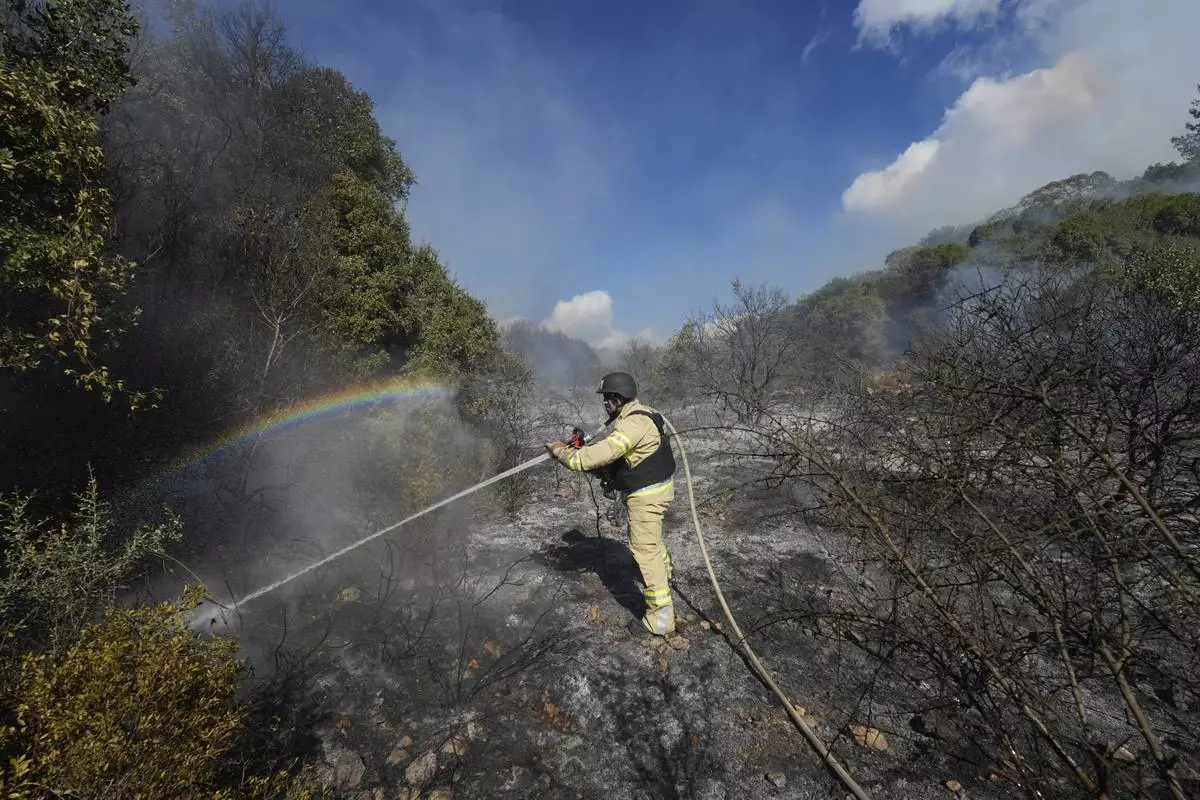
An Israeli firefighter works to extinguish a fire after a rocket fired from Lebanon hit an open field in northern Israel, Wednesday, Sept. 18, 2024. (AP Photo/Baz Ratner)












